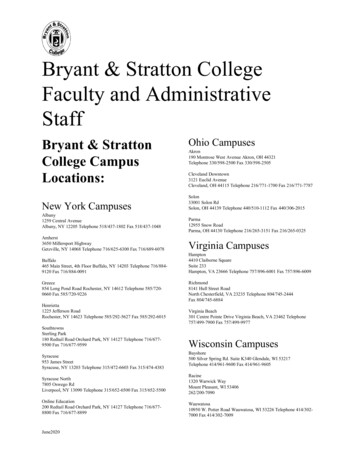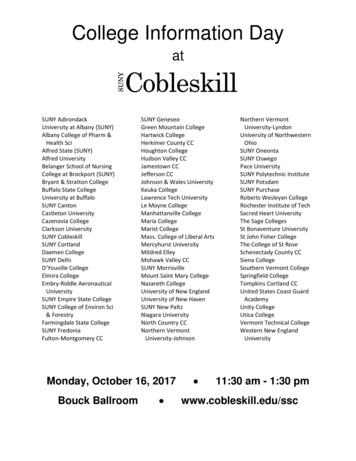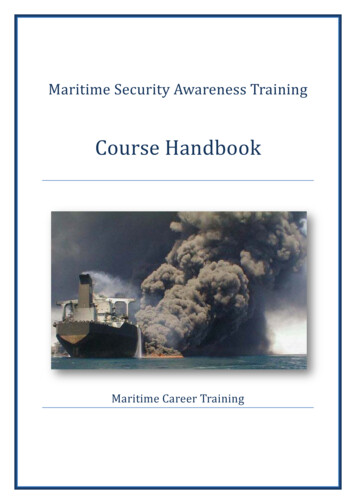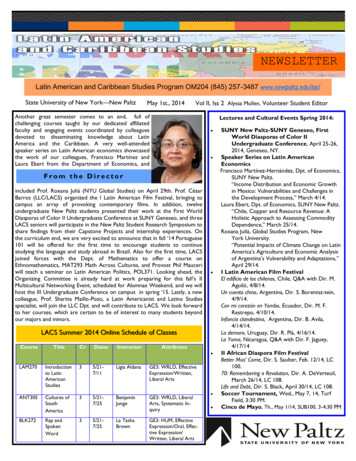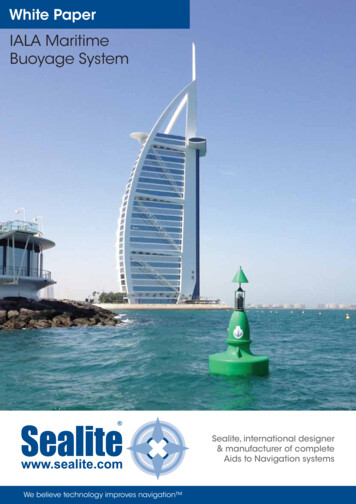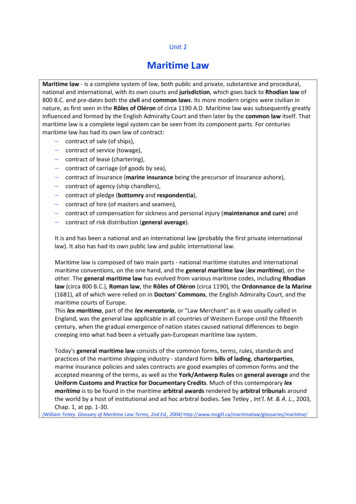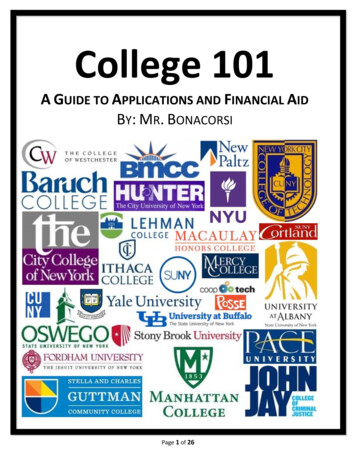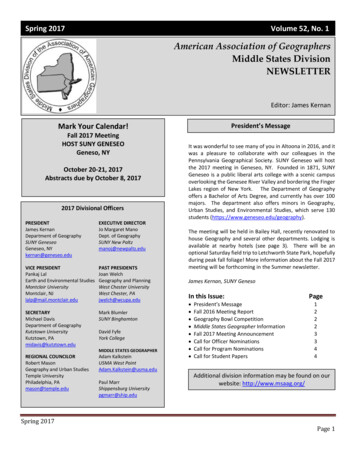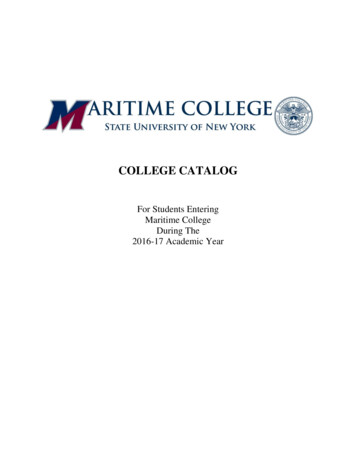
Transcription
COLLEGE CATALOGFor Students EnteringMaritime CollegeDuring The2016-17 Academic Year
Table of ContentsA Message from the PresidentMission, Vision, and Core ValuesLeadershipAccreditationsNon-Discrimination PolicyAdmissionsApplication and Evaluation ProceduresRequirements for AdmissionsAdditional Candidacy CategoriesPre-Freshman TestingUndergraduate Transfer Credit Policies and ProceduresSources of Transfer CreditGeneral Transfer Credit GuidelinesTransfer Credit ProceduresCredit Earned While in High SchoolExperiential LearningArticulation AgreementsAdvanced Placement Examinations TableCLEP TableGraduate Transfer Credit Policies and Procedures2016-17 Tuition and FeesTuition, Fees, and Refund PoliciesHealth InsuranceMeal PlansNew York State ResidencyPast Due AccountsRefund SchedulesFinancial AidApplicant EligibilityApplication and ProceduresAcademic Departments and Contact InformationAcademic Policies and ProceduresAcademic AdvisingAcademic BoardAcademic Distress and Sanctions Policy – UndergraduateAcademic Distress and Sanctions Policy – GraduateAcademic IntegrityAccommodation ServicesAdministrative DisenrollmentAuditing a CourseCredit Course LoadCredit Hour PolicyDeclaring a MajorDouble MajorsDrop/Add a CourseEducation Law (224-A)FERPAFinal ExaminationsForgiveness Policy
Good Academic StandingGrade AppealGraduation HonorsGraduation RequirementsLeave of AbsenceLines of CommunicationOfficial Grades and Calculation of GPAReadmission after a Withdrawal/Academic Disenrollment/Administrative DisenrollmentRegistrationRepeat a CourseSatisfactory Academic Progress Policy for Financial AidSemester HonorsSTCW (Standards of Training, Certification and Watchkeeping)SyllabusWithdrawal from SchoolGeneral Education at SUNY Maritime CollegeDegrees, Majors, and Professional Experience OptionsUndergraduate Degree Curricula NotesGeneral RemarksRules about Curriculum ChangesDefinitions of Elective Categories for Undergraduate Degree CurriculaUndergraduate Degree CurriculaB.E. in Electrical Engineering (Deck, Engine, Internship)B.E. in Facilities Engineering (Engine, Internship)B.E. in Marine Engineering (Engine)B.E. in Mechanical Engineering (Engine, Internship)B.E. in Naval Architecture (Deck, Engine, Internship)B.S. in International Transportation and Trade with InternshipB.S. in Marine Environmental Science, Marine Biology Minor (Deck, Internship)B.S. in Marine Environmental Science, Meteorology & Oceanography Minor (Deck, Internship)B.S. in Marine Operations (Deck, Engine)B.S. in Marine Transportation (Deck)B.S. in Maritime Studies (Deck, Internship)A.A.S. in Marine Technology: Small Vessel Operations (Limited Engine, Limited Deck)Minors PolicyList of Approved Minors and RequirementsGraduate Degree Curricula NotesGeneral RemarksRules about Curriculum ChangesGraduate Degree CurriculaM.S. in International Transportation ManagementM.S. in Maritime and Naval StudiesAdvanced Certificate in Supply Chain ManagementUndergraduate Course DescriptionsCourse PrefixesGeneral Note on the Scheduling of CoursesDefinition of Prerequisite and Corequisite CoursesSUNY General Education RequirementsBIO BiologyCHEM ChemistryCHIN Chinese
CS Computer ScienceENGL EnglishENGR EngineeringES Environmental ScienceGBAC AccountingGBEC Economics and FinanceGBLW LawGBMG ManagementGBTT Transportation SystemsGBUS General BusinessGEOL GeologyHIST HistoryHUMN HumanitiesLEAD LeadershipMATH MathematicsMETE MeteorologyMTDO Marine Technology Deck OfficerMTEO Marine Technology Engine OfficerMT Marine TransportationNAUT Nautical ScienceNAVG NavigationNVSC Naval ScienceOCEA OceanographyPE Physical EducationPHYS PhysicsPS Professional StudiesSPAN SpanishSS Social ScienceCourses in ReserveCourses Deleted from Course CatalogGraduate Course DescriptionsCourse PrefixesGeneral Note on the Scheduling of CoursesDefinitions of Prerequisite and Corequisite CoursesMNST Maritime and Naval StudiesTGMT Transportation ManagementCourses in ReserveCourses Deleted from Course CatalogFaculty DirectoryAcademic Calendar – Summer 2016Academic Calendar – Fall 2016 / Spring 2017
A Message from the PresidentDear Maritime College Community,Maritime College is a unique institution of higher learning with a veryspecific mission: educating dynamic leaders for the maritime industry.As the oldest and largest maritime academy in the country, we have along tradition of ensuring our graduates are well prepared for excitingcareer opportunities in the maritime, engineering, energy, marineenvironmental, and business sectors. Key to your success are ourcore values: academic excellence, student centeredness, appliedlearning, relevance, leadership, integrity, and respect.Our e-Catalog provides a one-stop source of information for ourstudents, prospective students, faculty and staff, about MaritimeCollege’s admissions; academic curricula and requirements; the academic calendar;student services; rules, regulations, and policies; and a list of administrative officers andfaculty.I encourage you to review this catalog, refer to it often, and provide feedback regardinghow we can improve it make it more useful for you and others.I hope that you have a positive and rewarding experience while at SUNY MaritimeCollege. I look forward to seeing you on campus.All the best,Michael A. Alfultis, Ph.D.Rear Admiral, United States Merchant Marine ServicePresident, SUNY Maritime College
MISSION STATEMENTFirst and foremost, Maritime College educates dynamic leaders for the global maritimeindustry.VISION STATEMENTMaritime College will be recognized as the leading maritime educational institution.CORE VALUESAcademic Excellence - Maritime College is committed to the pursuit of excellence in teaching,scholarship, and researchStudent-Centeredness - Maritime College is committed to an environment that values studentsuccess, development and personal growthIntegrity - Maritime College is committed to principles of integrity and ethics in all aspects of ouroperationsRespect - Maritime College embraces diversity & inclusion, and celebrates the uniquecontributions of allLeadership - Maritime College is committed to providing multiple leadership developmentopportunities for all studentsApplied Learning - Maritime College programs and majors are infused with hands-on,experiential learning opportunitiesRelevance - Maritime College has an adaptive curriculum that responds to the complex andevolving needs of the maritime industry
LeadershipSUNY Board of TrusteesH. Carl McCall, ChairJoseph BelluckCourtney BurkeMarc CohenEric CorngoldRobert DuffyRonald EhrenbergAngelo FattaPeter KnuepferEunice A. LewinMarshall LichtmanStanley LitowRichard SocaridesCarl SpielvogelEdward SpiroCary StallerNina TamrowskiLawrence WaldmanSUNY Chancellor’s CabinetNancy L. Zimpher, ChancellorAlexander N. Cartwright, Provost and Executive Vice ChancellorEileen G. McLoughlin, Senior Vice Chancellor for Finance and Chief Financial OfficeJoseph Porter, Senior Vice Chancellor for Legal Affairs and General CounselStacey Hengsterman, Chief of StaffJohanna Duncan-Poitier, Senior Vice Chancellor for Community Colleges and the Education PipelineRobert Haelen, Vice Chancellor for Capital Facilities, & General Manager of the Construction FundElizabeth L. Bringsjord, Vice Chancellor for Academic Affairs and Vice ProvostJennifer LoTurco, Associate Vice Chancellor for External AffairsMary Beth Labate, Senior Advisor to the Chancellor for Fiscal PolicySUNY Maritime College CouncilTimothea S. Larr, ChairMark J. BrosnanWilliam J. GarryThomas J. HigginsJoseph R. ConwayChristopher DeddoPresident’s CabinetRADM Michael Alfultis, USMS, Ph.D., PresidentDr. Joseph C. Hoffman, Interim Provost and Vice President for Academic AffairsAimee Bernstein, Vice President of University RelationsScott Dieterich, Vice President of Finance & AdministrationCAPT Richard Smith, Captain of the Training ShipCAPT Mark Woolley, Chief of Staff, Director of Institutional Research & AssessmentGovernanceMaritime College operates on the principle of Shared Governance, a belief that it is necessary for thewelfare of the institution that the values, effort, and responsibility be shared between faculty, staff, andadministration to effect the desired outcomes for the students. This principles intended to be consistent
and compliant with the Policies of the SUNY Board of Trustees trustees/ ),As a consequence, faculty and staff have and will continue to have roles in determination ofpolicy, establishment and changes to the curricula, searches for personnel, implementation ofacademic rules and regulations, and the conduct of student affairs.The Faculty of Maritime College, as defined by the College By-Laws, includes the followingcommittees which play keys roles in these aspects of Shared Governance: Curriculum CommitteeFaculty Policies CommitteeStudent Policies CommitteeFaculty Assessment CommitteeThe faculty and staff also play key roles on the Academic Board and the Faculty Student Association.AccreditationsSUNY Maritime College is accredited by the Middle States Commission on Higher Education, 3624Market Street, Philadelphia, PA 19104 (267-284-5000). The Middle States Commission on HigherEducation (MSCHE) is an institutional accrediting agency recognized by the U.S. Secretary of Educationand the Council for Higher Education Accreditation. SUNY Maritime College has been a member ofMSCHE since 1952, and was most recently reaffirmed on June 28, 2012. The next Periodic ReviewReport is due 2017, and the next Self-Study Evaluation is due 2012-2022.In addition, SUNY Maritime College’s Bachelor of Engineering programs (Electrical, Facilities, Marine,Mechanical and Naval Architecture) are also accredited by the Accreditation Board for Engineers andTechnology (ABET). ABET is a non-profit and non-governmental accrediting agency for academicprograms in the disciplines of applied science, computing, engineering, and engineering technology.ABET is a recognized accreditor in the United States (U.S.) by the Council for Higher EducationAccreditation. SUNY Maritime College’s engineering programs have been accredited since 2009-2010.The next Comprehensive Review is due 2016-2017.Non-Discrimination PolicyIt is the policy of SUNY Maritime College to ensure equality without discrimination or harassment on thebasis of race, color, national origin, religion, creed, age, sex, sexual orientation, disability, gender identityor expression, familial status, pregnancy, predisposing genetic characteristics, military status, domesticviolence victim status or criminal conviction. It is also the policy of SUNY Maritime College thatemployees, students and guests respect diversity and react to one another with civility.Any and all forms of discrimination or harassment which involve or affect SUNY Maritime College (“theCollege”) or which occur on the College’s campus, or in any off-campus location that could beconsidered an extension of the College, (i.e., the Empire State Training Ship even at times it is away fromthe campus, or when employees, students, and others are in official travel status as representatives of theCollege, etc.), are prohibited by this policy.
Please Note:The information provided in this catalog reflect the most up-to-date information available at the time ofpublication. Supplementary material will be provided when possible in the event of change. The Collegereserves the right to revise any material provided herein at any time, including the deletion of variouscourses and programs.
AdmissionsAdmission to Maritime College is based on the qualifications of the applicant, and is granted withoutregard to race, color, gender, religious beliefs, sexual orientation, gender identity, or national origin.Successful applicants must meet the requirements for admission as stated below. Applicants are welcometo provide the Admissions Office with additional information regarding their achievements or with astatement concerning their exceptional circumstances.Regional StatusNew York’s Maritime College is now the Regional Maritime Academy for students from Alabama,Connecticut, Delaware, Florida, Georgia, Louisiana, Maryland, Mississippi, New Jersey, North Carolina,Pennsylvania, Rhode Island, South Carolina, Virginia, and Washington D.C. Students from these statespay a discounted in-region tuition rate to attend SUNY Maritime College.Application and Evaluation ProceduresFreshmen ApplicationApplication for admission to Maritime College may be obtained online through the SUNY App or theCommon Application at www.sunymaritime.edu/admissions. All candidates must submit the following: Application for Admission Transcript of high school record (forwarded by your HS to the Admissions Processing , 279ABroadway,Albany NY 12204) Transcript of college record (forwarded by previous college to the Admissions Processing , 279A Broadway, Albany, NY 12204) Results of the SAT/ACT (forwarded by the testing agency directly to the Maritime College) Two Letters of Recommendations (to be sent directly to the Admissions Processing, 279ABroadway, Albany, NY 12204) Essay (essays are to be submitted through the SUNY application or the Common Application)Candidates for admission through the Educational Opportunity Program (EOP) must indicate so on theapplication and submit the Free Application for Federal Student Aid (FAFSA) so that eligibility can beverified.International applicants should follow instructions in the International Students section that follows in thissection of the catalog.EvaluationFreshman admission decisions are based on the strength of your high school curriculum taken, SAT orACT, extra-curricular activities and letters of recommendation. . The items below are viewed as keycomponents of the admissions decision. high school average SAT or ACT scores * mathematics/science average teacher/counselor level of difficulty of high schoolrecommendations.courses attempted* All freshman applicants must take the SAT or ACT. We look at the combined score of criticalreading/evidence based reading & writing and mathematics sections on the SAT or composite ACTscore. Our exam codes are:SAT: 2536ACT: 2954
Decisions fall into the following categories: accept, deny, and waitlist. Students are considered foracceptance if they meet the requirements stated in the following section at the time of application.Deferred status must be approved and is granted for up to a year.Decision DeadlinesThe fall early decision application deadline is Nov. 1. The regular deadline to apply for fall admission isJan. 31. Spring application deadline is Nov. 1.Requirements for AdmissionsScholastic RequirementsApplicants must be high school graduates, recipients of a high school equivalency diploma (GED) orexpect same by the time of enrollment. At the time of graduation, HS students must have completed atleast 14 units of credit unless state or local requirements for graduation differ. These include thefollowing: 4 years of English4 years of social studies3 years of mathematics (pre-calculus is required for engineering)3 years of science (chemistry and physics are strongly recommended)Students are encouraged to pursue mathematics and science beyond the required minimum. Theremaining required units can be in social studies, science, mathematics, and foreign languages. Units inother subjects will be individually evaluated. Some experience and familiarity with computer applicationsand/or a programming language is suggested, particularly for engineering applicants.Health RequirementsGeneralNew York State law requires all college students born on or after January 1, 1957 to be immunizedagainst measles, mumps and rubella. All undergraduate and graduate students have to show proof ofimmunity. Immunization for measles requires two doses of vaccine. Exemption from this requirement ispossible for those documenting valid religious or medical reasons.Accepted students are required to complete a physical examination by a physician of their choice prior toenrollment. Medical forms to be used for this examination will be sent to all students by the College.Completed physical examination forms are to be returned to the Admissions Office by the student.Applicants who have applied for ROTC scholarship competition, or for admission to a service academy,may request a copy of their physical examination report from the Department of Defense Medical ReviewBoard and forward it to the Health Services Office.License Program CandidatesIn general, recognized illnesses or physical defects, such as epilepsy and diabetes, that would render theapplicant incapable to perform the regular duties or interfere with the ordinary duties of an officer at seaare disqualifying. A complete list of disqualifying illnesses may be obtained from the Health ServicesOffice.Vision Requirements (Licensing Programs)Coast Guard regulations concerning the original licensing of Merchant Marine Officers require applicantsto have uncorrected vision of at least 20/100 in both eyes, correctable to at least 20/20 in one eye and
20/40 in the other eye for Deck Officers. For Engineering Officers, vision must be 20/100 in both eyes,correctable to at least 20/30 in one eye and 20/50 in the other. Inadequate color perception may disqualifyan applicant for licensure. The vision of all prospective cadets will be confirmed by the college. (TheCoast Guard routinely authorizes waivers of uncorrected vision up to 20/200 and will consider waiversfor vision below that level.)Drug Testing (Licensing Programs)All cadets, and all students enrolling in any program aboard the Training Ship, are required to submit to afederally mandated drug test prior to each Summer Sea Term, and again with application for licensure.Additionally, prior to taking the license examinations, First Class cadets must make an application to theU.S. Coast Guard. Several College officials must attest to the character and temperate habits of the cadeton their application. Questions concerning drugs and court convictions must also be answered under oathby the cadet.Cadets may be removed from the license program for inaptitude.Cadet (Not Physically Qualified)Applicants who do not meet the physical requirements for license as an officer for the Merchant Marinebut who are otherwise fully capable of participating in all facets of the program without endangeringthemselves or others may enroll in a Degree/License program at the Maritime College, take degree andlicense courses including Summer Sea Terms, and participate fully in all facets of the Maritime Collegeprogram. Graduates may request a waiver of physical requirements from the Coast Guard. Since physicalwaivers for license are determined on an individual basis at the time of applying for the license during thesenior year, cadets who are not physically qualified should not anticipate receiving a waiver. While acadet may not be physically qualified for license in the Merchant Marine, he/she may be eligible forcommission in the Naval Reserve through NROTC as physical requirements for the two programs differ,especially with regard to vision. Students who are not physically qualified for the Degree/LicensePrograms do qualify for the Degree Programs.Additional Candidacy CategoriesTransfer StudentsTransfer students are selected primarily on the basis of all college level academic performance. To beconsidered a transfer applicant, submit the following credentials: A completed application (available through the SUNY Application or the Common Applicationonline at www.sunymaritime.edu/admissions). Official college transcripts documenting all post-secondary work, sent directly from theinstitution to the Maritime College Admissions Office.Transfer students pursuing the Degree/License Program are required to complete the IndoctrinationProgram (see "Student Life") in August, prior to commencement of the fall semester. Upon completion ofthe Indoctrination Program, transfer students from sea service academies and other maritime institutionsmay request upgrade of class status. All other transfer students into Degree/License Programs will enrollas Fourth Class cadets for their first year at Maritime. Transfer students pursuing a Degree Program arerequired to attend the new student orientation, but will enroll directly at the appropriate class level.A separate section on transfer credit policies and procedures can be found in this catalog following theadmissions section.
International StudentsAdmission for international students is based on a review of the appropriate educational documents aswell as proficiency in English as measured by the Test of English as a Foreign Language (TOEFL) orInternational English Testing System (IELTS). Freshman applicants may also submit SAT or ACTscores.Prospective transfer and graduate degree candidates must arrange to have a course-by-course evaluationof all college coursework completed outside the U.S. sent to the Office of Admissions. Those individualswho have completed courses in the U.S. must arrange for official transcripts to be sent directly to theOffice of Admissions. TOEFL (Test of English as a Foreign Language) minimum scores are: 79 for the internet-based test,213 for the computer-based test and 550 for the paper-based test. IELTS (International English Language Testing System) minimum score is: 6.5.International students who enroll as cadets pursuing the Degree/License Program participate in all facetsof campus life, including regimental responsibilities ashore, and as cadet officers during Summer SeaTerms. At graduation, international students receive the B.S. or B.E. Degree and may be certified by theCoast Guard that they meet all requirements for licensure except citizenship. International students whoenroll as students pursuing the degree programs are eligible for all leadership roles within that program,including Resident Assistantships.Educational Opportunity Program (EOP)SUNY’s Educational Opportunity Program provides access, academic support and financial aid tostudents who show promise for succeeding in college but who may not have otherwise been offeredadmission. Available primarily to full-time, matriculated students, the program supports studentsthroughout their college careers. EOP is designed for students who need special academic assistance aswell as financial aid. You will be asked to complete additional application materials and financial aidforms by the colleges to which you are applying.Educational Opportunity Program students may receive support services, such as academic, career, andpersonal counseling; tutoring and supplemental instruction. As part of a student's overall financial aidpackage, the Educational Opportunity Program provides financial assistance for non-tuition relatedexpenses (e.g. books, supplies, etc.).Questions should be directed to either the Office of Admissions or the Director of the EOP program.Pre-Freshman TestingTesting in mathematics is required of all entering freshmen. The Academic Dean administers theseexaminations at the College during the summer before entrance. For those who cannot travel to thecampus, arrangements can be made with your HS guidance counselor to have the tests administered atyour high school. Students will have the opportunity to be re-tested during the orientation period.All 4-year programs at the Maritime College require at least two semesters of mathematics, andengineering programs are designed with the expectation that students will start Calculus I at the beginningof their freshman year. The mathematics placement test is designed to assess whether additionalmathematics preparation is required and at what level. Some students may be advised to take anappropriate remedial mathematics course at Maritime over the summer or an equivalent program atanother institution before matriculation in the Fall semester. Failure to do so may prevent a student fromgraduating in a timely manner.
THE STATE UNIVERSITY of NEW YORK MARITIME COLLEGEOFFICE of the REGISTRARTRANSFER CREDIT POLICIES AND PROCEDURESUNDERGRADUATETransfer of credit to SUNY Maritime College involves consideration of the comparability of courseworkand the applicability of that coursework to a Maritime degree program. This document of transfer policiesand procedures will help you transition to the undergraduate program of your choice at SUNY MaritimeCollege.There are two limitations on the number of transfer credits that can be awarded to a student:The maximum number of transfer credits from all sources described in this document, whether for coursestaken before arrival or while a student at SUNY Maritime College is: 90 credits for a bachelor’s degree,45 credits for an associate’s degree.All bachelor’s degree students must take a minimum of 42 credits at SUNY Maritime College, at least 18 ofwhich must be via upper-division major courses as identified by the major department; all associate’sdegree students must take a minimum of 30 credits at SUNY Maritime College, at least 12 of which mustbe via major courses as identified by the major department.PART ONESources of Transfer CreditTransfer Credit ProceduresPART TWOCredit Earned While in High School Advanced Placement International Baccalaureate College courses taken through a collegeExperiential Credit CLEP Exams DANTES Exams Excelsior Exams Military Service Governmental and Corporate TrainingPART THREEArticulation Agreements
THE STATE UNIVERSITY of NEW YORK MARITIME COLLEGEOFFICE of the REGISTRARPART ONESOURCES OF TRANSFER CREDITSUNY Maritime College standardly evaluates and awards transfer credit for course work at post-secondaryinstitutions that are regionally accredited. The regional accrediting agencies are: Middle States Association of Colleges and Schools (MSA, www.msache.org)Northwest Commission on Colleges and Universities (NASC, www.nwccu.org)New England Association of Schools and Colleges, Inc.—Commission on Institutions of HigherEducation (NEASC-CIHE, www.neasc.org)North Central Association of Colleges and Schools (NCA, www.ncahigherlearningcommission.org)Southern Association of Colleges and Schools/Commission on Colleges (SAS-CC,www.sacscoc.org)Western Association of Schools and Colleges (WASC, www.wascweb.org)Students with prior college-level course work at institutions without regional accreditation may request ameeting with the Academic Dean for an evaluation; detailed syllabi may be required in order to receivetransfer credit.SUNY Maritime College also transfers credit completed at recognized post-secondary institutions outside theUnited States. In most cases, foreign institutions are chartered and authorized to grant degrees by theirnational governments, usually through a Ministry of Education or similar ministerial body. SUNY MaritimeCollege does not evaluate these credits. Students must have the credits evaluated by World EducationServices (WES, www.wes.org) or an equivalent professional credential evaluation organization.Credit by standardized exams is also accepted. These exams are: Advanced Placement (AP), InternationalBaccalaureate (IB), College Level Examination Program (CLEP), DANTES Subject Standardized Tests(DSST), and Excelsior College Exams (ECE, formerly Regents Exams). Details about earning credit forthese exams are found in PART TWO below.Transfer credit may be awarded for work completed outside a college setting if that work has been evaluatedand approved for credit by ACE. This includes credit for military service and credit from corporate andgovernmental trainings. The credit must have been ACE-approved at the time it was earned. If the creditrecommendation states that credit may be granted on the “basis of institutional evaluation,” MaritimeCollege does not grant credit as it does not perform such evaluations of transfer credit.Credit for courses more than ten years old may be denied based on currency issues, e.g., course contentoutdated, new technology considerations, student review of subject matter necessary.
THE STATE UNIVERSITY of NEW YORK MARITIME COLLEGEOFFICE of the REGISTRARTRANSFER CREDIT PROCEDURESTransfer credit for all courses is determined by the Academic Dean and the chair of the relevant department.For Deck or Engine license courses, strict equivalency and appropriate recency must be established beforetransfer credit is awarded. The U.S. Coast Guard's policy is that the academy from which a studentgraduates is responsible for documenting completion of all program requirements in accordance with theapproval granted to that academy. Therefore, students who wish to transfer certain license or STCWcourses from another maritime academy must provide a transcript, training record book (if appropriate) andany other pertinent documentation to be evaluated on a case-by-case basis, to determine whether suchtraining and education was successfully completed, and is thus transferable. The Dean of MaritimeEducation and Training, in consultation with the appropriate license Department Chair (or designee), willconduct a review of this information, in accordance with current U.S. Coast Guard and MARAD nationaland international regulations and policy, and provide a determination regarding acceptable transfer credit.Note that transfer credits may be awarded for courses that do not meet the requirements of a student’schosen degree program. Thus, a student’s transfer credits may include some that apply towards the degreeand some that do not. If a student changes his/her degree program, the applicability of credits may alsochange.To assure that credit will be awarded for courses taken after matriculation at SUNY Maritime College,students should seek prior approval from the appropriate department.Transfer credit for SUNY General Education requirements:All SUNY students must complete thirty (30) SUNY General Education credits covering a minimum ofseven of ten knowledge and skills areas. Two of
Accreditation. SUNY Maritime College’s engineering programs have been accredited since 2009-2010. The next Comprehensive Review is due 2016-2017. Non-Discrimination Policy It is the policy of SUNY Maritime College to ensure equ
